|
Printables |
PowerPoints |
Online exercises |
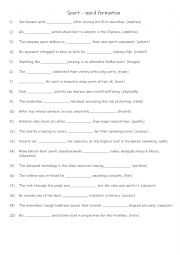
|
B1+ Sport - word formation
Understanding word formation allows students to expand their vocabulary, enabling them to express themselves more precisely and creatively. Knowing how to manipulate words helps them create varied sentence structures, making their writing more engaging and dynamic. Mastering word formation is key to achieving higher levels of language proficiency, ...
Level: intermediate
Age: 9-100
Type:
Downloads: 129
|
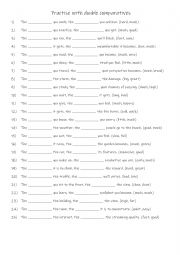
|
A2+-B1 Double comparatives
Double comparatives are a useful structure in English to express proportional relationships between two actions or situations, showing how one thing influences or depends on another. The structure typically follows the pattern: "The + comparative adjective + subject, the + comparative adjective + result." This construction helps convey cause-and-ef...
Level: elementary
Age: 9-100
Type:
Downloads: 129
|
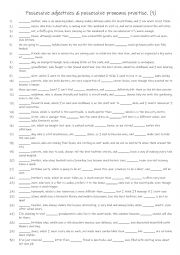
|
A1+-A2 Possessive adjectives & possessive pronouns practise. (1)
Learning possessive adjectives and possessive pronouns is essential for expressing ownership and relationships clearly and naturally in English. Possessive adjectives (like my, your, his, her) are used before nouns to show who something belongs to, while possessive pronouns (like mine, yours, his, hers) stand alone and replace nouns, avoiding repet...
Level: elementary
Age: 8-100
Type: worksheet
Downloads: 129
|
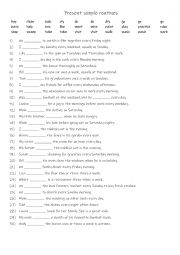
|
A1+-A2 Present simple routines + 3rd person practise
Learning present simple routines with these verbs is useful because it helps describe everyday actions in English, which is important for basic conversation. The present simple tense is used to talk about habits and routines, so knowing these verbs allows students to share information about daily life, like "I wash dishes every evening" or "She vis...
Level: elementary
Age: 8-100
Type:
Downloads: 129
|
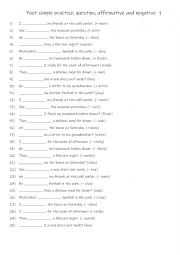
|
A1 Past simple practise with: question, affirmative and negative 1
Learning the past simple tense with questions, affirmative, and negative sentences is essential for students as it enables effective communication about past events. It provides a foundation for understanding grammar and constructing basic sentences, which is crucial for daily conversations. Mastering these forms ensures students can ask questions,...
Level: elementary
Age: 8-100
Type:
Downloads: 129
|
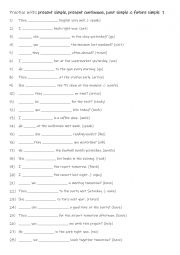
|
A1+-A2 Practise with present simple, present continuous, past simple & future simple 1
Students should practise the present simple, present continuous, past simple, and future simple because these tenses are the foundation of effective communication. The present simple is used for habits, routines, and facts, while the present continuous describes ongoing or temporary actions. The past simple helps in narrating completed actions and ...
Level: elementary
Age: 8-100
Type:
Downloads: 129
|
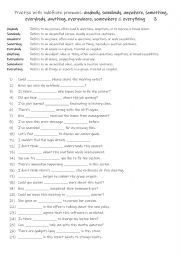
|
A2-B1 Practise with indefinite pronouns anybody, somebody, anywhere, something, everybody, anything, everywhere, somewhere & everything 3
First, students need to familiarise themselves with the 9 indefinite pronouns and their meanings and use. Then they read the sentences to work out which one is needed to complete the gap-fill. Each word is used 3 times! Answers on page 2
Level: elementary
Age: 9-100
Type:
Downloads: 129
|
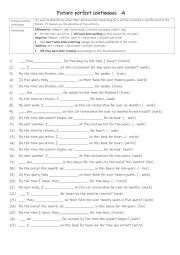
|
B1+-B2 Future perfect continuous 3
Mastering this tense allows students to add precision and depth to their language, making their communication more detailed and professional when describing extended future actions. First, students need to familiarise themselves with the tense and check formation and use. Then they read the sentences to work out which form is needed to complete the...
Level: intermediate
Age: 12-100
Type:
Downloads: 129
|
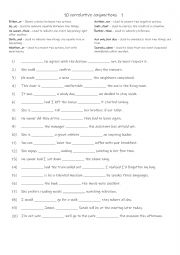
|
B1-B2 10 correlative conjunctions 1
First, students need to familiarise themselves with the 10 conjunctions and their meanings. Then they read the sentences to see which one is required to complete the gap-fill. Each linker is used 2 times! Answers on page 2.
Level: intermediate
Age: 10-100
Type:
Downloads: 129
|
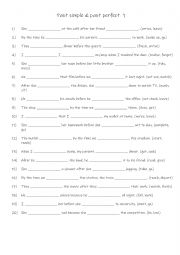
|
Past simple & past perfect 1
Learning the past simple and past perfect tenses is crucial for students as it helps them communicate clearly about past events, showing when actions occurred and how they relate to one another in time. Mastering these tenses improves storytelling, writing, and speaking, enabling students to convey events in a logical and nuanced way. Additionally,...
Level: elementary
Age: 8-100
Type:
Downloads: 129
|
|
|
|
|












